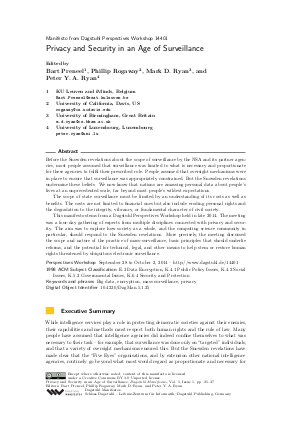Privacy and Security in an Age of Surveillance (Dagstuhl Perspectives Workshop 14401)
Authors Bart Preneel, Philipp Rogaway, Mark D. Ryan, Peter Y. A. Ryan
-
Part of:
Issue:
Dagstuhl Manifestos, Volume 5, Issue 1
Part of: Volume: Dagstuhl Manifestos, Volume 5
Part of: Journal: Dagstuhl Manifestos (DagMan) - License:
 Creative Commons Attribution 3.0 Unported license
Creative Commons Attribution 3.0 Unported license
- Publication Date: 2015-11-13
File

PDF
DagMan.5.1.25.pdf
- Filesize: 0.67 MB
- 13 pages
Document Identifiers
Subject Classification
Keywords
- Big data
- encryption
- mass surveillance
- privacy
Metrics
- Access Statistics
-
Total Accesses (updated on a weekly basis)
0Document
0Metadata
Abstract
Before the Snowden revelations about the scope of surveillance by the NSA and its partner agencies, most people assumed that surveillance was limited to what is necessary and proportionate for these agencies to fulfil their prescribed role. People assumed that oversight mechanisms were in place to ensure that surveillance was appropriately constrained. But the Snowden revelations undermine these beliefs. We now know that nations are amassing personal data about people's lives at an unprecedented scale, far beyond most people's wildest expectations. The scope of state surveillance must be limited by an understanding of its costs as well as benefits. The costs are not limited to financial ones but also include eroding personal rights and the degradation to the integrity, vibrancy, or fundamental character of civil society. This manifesto stems from a Dagstuhl Perspectives Workshop held in late 2014. The meeting was a four-day gathering of experts from multiple disciplines connected with privacy and security. The aim was to explore how society as a whole, and the computing science community in particular, should respond to the Snowden revelations. More precisely, the meeting discussed the scope and nature of the practice of mass-surveillance, basic principles that should underlie reforms, and the potential for technical, legal, and other means to help stem or restore human rights threatened by ubiquitous electronic surveillance.
Cite As Get BibTex
Bart Preneel, Philipp Rogaway, Mark D. Ryan, and Peter Y. A. Ryan. Privacy and Security in an Age of Surveillance (Dagstuhl Perspectives Workshop 14401). In Dagstuhl Manifestos, Volume 5, Issue 1, pp. 25-37, Schloss Dagstuhl – Leibniz-Zentrum für Informatik (2015)
https://doi.org/10.4230/DagMan.5.1.25
BibTex
@Article{preneel_et_al:DagMan.5.1.25,
author = {Preneel, Bart and Rogaway, Philipp and Ryan, Mark D. and Ryan, Peter Y. A.},
title = {{Privacy and Security in an Age of Surveillance (Dagstuhl Perspectives Workshop 14401)}},
pages = {25--37},
journal = {Dagstuhl Manifestos},
ISSN = {2193-2433},
year = {2015},
volume = {5},
number = {1},
editor = {Preneel, Bart and Rogaway, Philipp and Ryan, Mark D. and Ryan, Peter Y. A.},
publisher = {Schloss Dagstuhl -- Leibniz-Zentrum f{\"u}r Informatik},
address = {Dagstuhl, Germany},
URL = {https://drops.dagstuhl.de/entities/document/10.4230/DagMan.5.1.25},
URN = {urn:nbn:de:0030-drops-55653},
doi = {10.4230/DagMan.5.1.25},
annote = {Keywords: Big data, encryption, mass surveillance, privacy}
}
